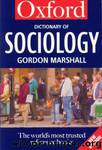A Dictionary of Sociology by Unknown

Author:Unknown
Format: mobi
Back - New Search
labour union
See TRADE UNION.
Back - New Search
Lacan, Jacques
(1901–83)
Lacan was a French psychoanalyst and doctor of medicine who reinterpreted the work of Sigmund Freud in the light of the structural linguistics of Ferdinand de Saussure. He trained at the Paris Medical Faculty, in 1963 became Chargé de Conférences at the École Pratique des Hautes Études, and founded the École Freudienne de Paris. He is largely associated with the structuralist and post-structuralist movements, and during the 1960s his seminars were a major focus of intellectual life in Paris. His work, which is often obscure and replete with puns and word-plays, has had a considerable influence on feminist theory, because of his argument that Freud's hypotheses must be interpreted symbolically rather than literally; and, in particular, that Freud's controversial idea of ‘penis envy’ should be treated metaphorically.
The unconscious, Lacan argues, is like language because it operates by using metaphor and metonymy—that is, it works symbolically. His refinement of Freudian theory has been seen by many as crucial because it avoided Freud's controversial and arguably contradictory idea that there are biological ‘drives’ that reduce all individuals to identical development patterns. Language, according to Lacan, constructs meaning throughout culture, but language is also mutable, so that change is therefore not only possible but also inevitable, both at a social and a personal level. Lacan's theory thus enables the development of identity and subjectivity to be seen much more as socially constructed than biologically determined.
Crucial to Lacan's overall theoretical system is his idea of the ‘mirror phase’ of infant development. He argues that, at around the age of six months, a baby, who has previously thought of itself not as a separate being from its mother, grows aware of being separate. Lacan uses the metaphor of a mirror to illustrate this process, for the baby, looking at the mother as if looking into a mirror, finds an image reflected back which it regards as a coherent and unified whole. In fact, however, the image it sees is the mother/other and not itself. It is this misinterpretation that splits the human psyche into two, because we all identify with something or someone who seems like what or who we want to be, and yet which is in fact separate and alien. This leads to a false belief in the wholeness and stability of the ego, which Lacan sees as a continually restructured process.
As a baby develops, it falls in love with its mother and begins to see the father as threatening to its desire to have the mother to itself. Lacan argues that it is this longing for the mother, and the denial of it by the father who symbolizes culture and the outside world to the baby, which acts to create the unconscious. This process splits the child, the subject, into consciousness and the unconscious, and the whole process is an essential part of a young child's acquisition of language. Awareness of gender difference and the acquisition of gendered subjectivity are also integral to this process.
Download
This site does not store any files on its server. We only index and link to content provided by other sites. Please contact the content providers to delete copyright contents if any and email us, we'll remove relevant links or contents immediately.
Shoot Sexy by Ryan Armbrust(17214)
Portrait Mastery in Black & White: Learn the Signature Style of a Legendary Photographer by Tim Kelly(16560)
Adobe Camera Raw For Digital Photographers Only by Rob Sheppard(16458)
Photographically Speaking: A Deeper Look at Creating Stronger Images (Eva Spring's Library) by David duChemin(16208)
Bombshells: Glamour Girls of a Lifetime by Sullivan Steve(13208)
Art Nude Photography Explained: How to Photograph and Understand Great Art Nude Images by Simon Walden(12439)
Perfect Rhythm by Jae(4689)
Pillow Thoughts by Courtney Peppernell(3558)
The Book of Joy by Dalai Lama(3313)
Good by S. Walden(2983)
The Pixar Touch by David A. Price(2809)
Fantastic Beasts: The Crimes of Grindelwald by J. K. Rowling(2594)
A Dictionary of Sociology by Unknown(2566)
Humans of New York by Brandon Stanton(2419)
Read This If You Want to Take Great Photographs by Carroll Henry(2349)
Stacked Decks by The Rotenberg Collection(2344)
On Photography by Susan Sontag(2197)
Photographic Guide to the Birds of Indonesia by Strange Morten;(2139)
Insomniac City by Bill Hayes(2131)
